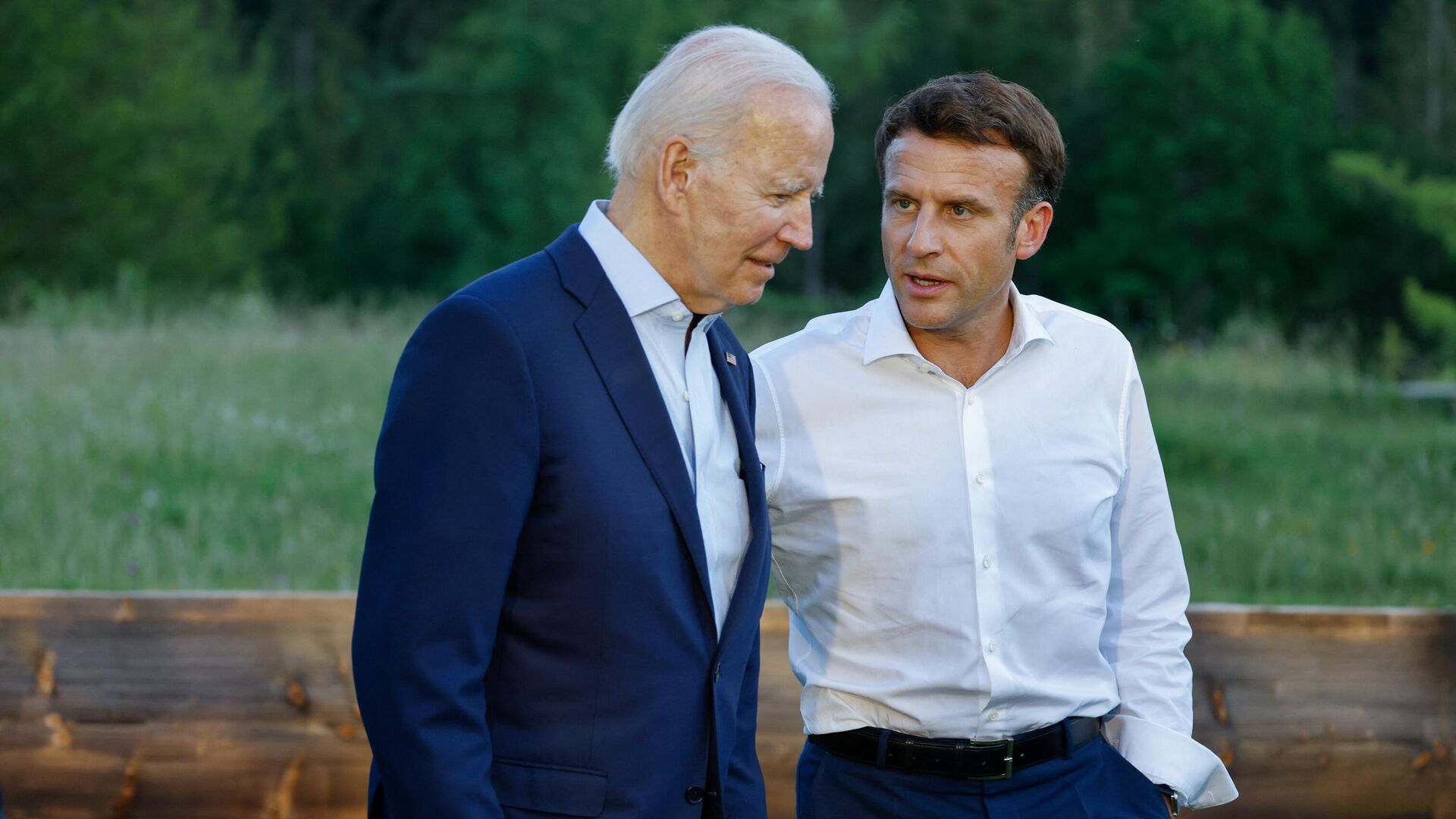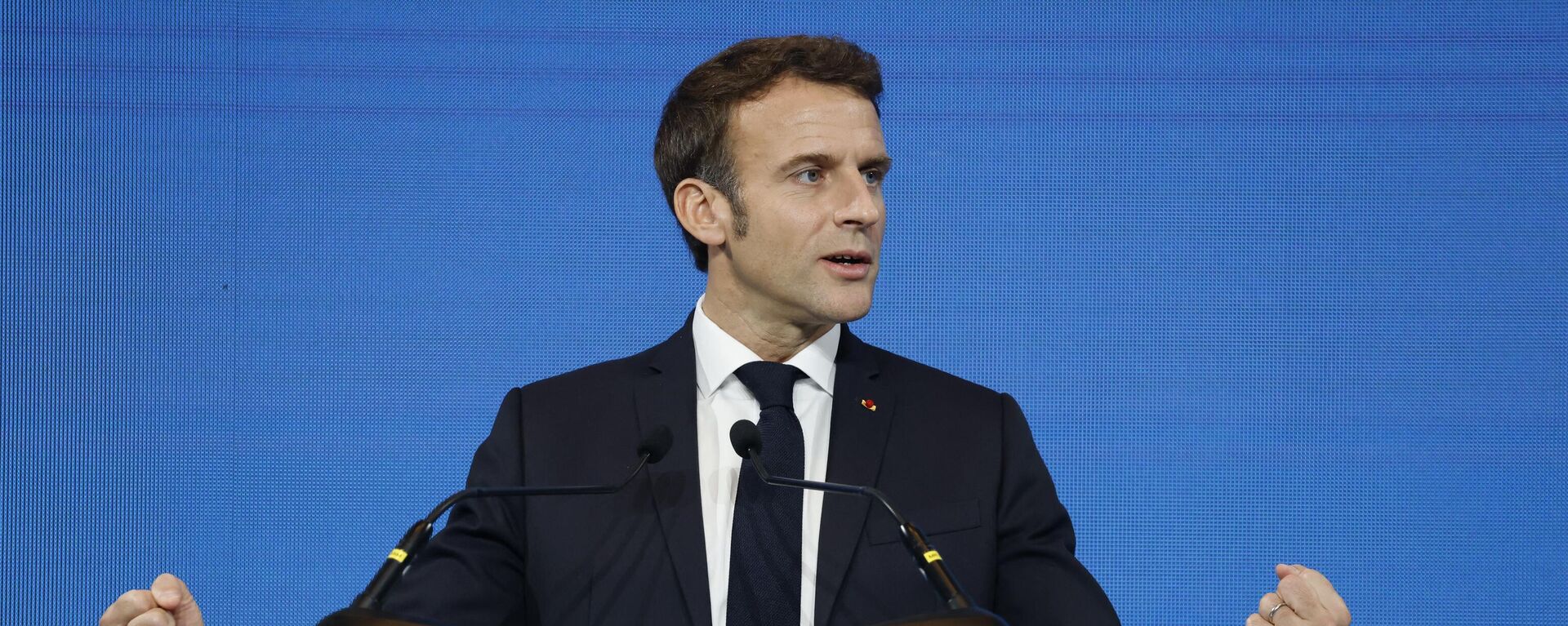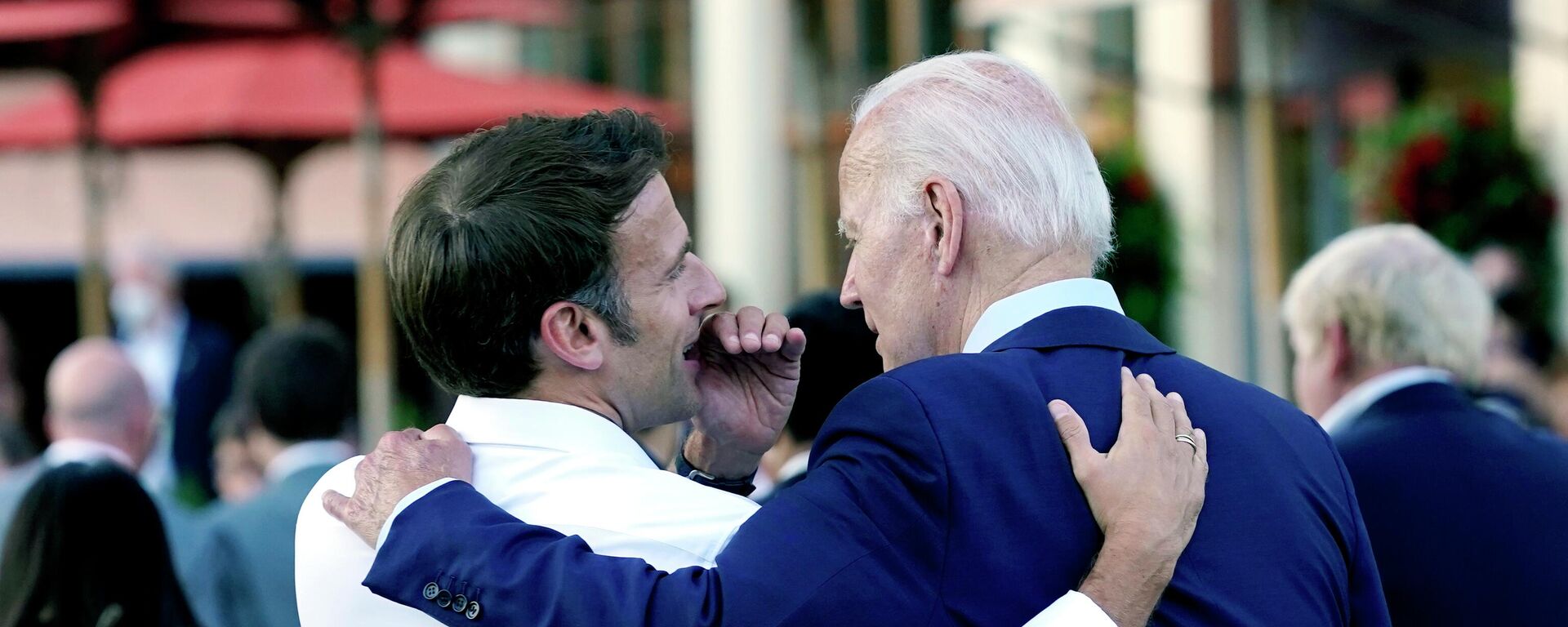Unequal Franco-American Relationship Will Survive the Inflation Reduction Act, Experts Say

© AFP 2023 / LUDOVIC MARIN
Subscribe
During a visit to Washington, DC, on Thursday, French President Emmanuel Macron said France and the United States had “decided to synchronize our agendas,” discussing key points of cooperation and conflict, including NATO military support for Ukraine and a new American law that threatens European industry.
Ahead of the meeting, Macron criticized the Inflation Reduction Act (IRA), a US law passed in August that provides subsidies for American industries, calling it “super-aggressive” and would increase Europe’s economic problems. The IRA has been touted by the White House as one of Biden’s most important legislative victories in his two years in office.
Dr. Paul Craig Roberts, an American economist and author who was assistant secretary of the Treasury in the Reagan Administration and associate editor of the Wall Street Journal, told Sputnik on Thursday that “Macron is in Washington to try to find out if Washington will adjust its policies so that Europe can remain industrialized. Cut off from energy, Europe is not capable of conducting a trade war with Washington.”
“Official reasons given for meetings between governments are often screens to hide the real issues. Macron is in Washington because it has dawned on Europeans that the combination of Washington's ‘Russian’ sanctions with Washington's ‘Inflation Reduction Act’ means the demise of European industry and the jobs, incomes, and tax base that are associated with it,” he noted.
“Washington's sanctions have had little effect on Russia but are devastating Europe. Business and trade relationships between Europe and Russia have been shattered. Russian energy flows to Europe have been essentially turned off, leaving Europe short of energy for her industries. How severe and long lasting this will be remains to be seen. The Inflation Reduction Act subsidizes manufacturers that produce within the US, thus giving the US competitive advantage over Europe.”
However, Dr. Roslyn Fuller, director of the non-profit think tank Solonian Democracy Institute and the author of the book “Beasts and Gods: How Democracy Changed Its Meaning and Lost Its Purpose,” said such disputes are fairly normal and don’t threaten the Franco-American relationship.
“The EU and US have had many trade disputes in the past, for example the beef hormone dispute, the Boeing/Airbus dispute (over subsidies) to name just a few,” she noted.
“The US and EU are the most prolific instigators of WTO trade dispute settlement proceedings. It's fairly normal for states to try to protect their industry (after all, this is one of their key jobs) and for others to complain if they feel that they are bending the rules. It would be unnatural for everyone to always get along and agree on these points,” Fuller said.
“Both politicians addressed this topic in their remarks, stating that they would work harder to align on this point and find ways to cooperate to everyone's benefit going forward. Biden definitely seemed quite accommodating on this point during the conference, referring to 'tweaks' that could be made and emphasizing several times that the USA did not wish to achieve supply chain independence at the expense of Europe.”
“I think the US's primary goal has been to break European ties with Russia, particularly over energy,” she added.
“The US definitely cares about Europe, and France is the sole EU member that is a nuclear power and on the United Nations Security Council,” she said.
“Biden and Macron are both neoliberal politicians who view themselves as bulwarks against right-wing populism. Neither the USA nor Biden wants to be dealing with the National Rally in power in France and in the various international institutions, so Macron, who managed to win centrist electoral victories in France during times of great upheaval is always going to be someone the US has to care about.”
Roberts agreed, but cast Europe in a subservient role, noting that “NATO is a means of Washington control.”
“Except for France under Charles de Gaulle, Western European governments and the UK have been Washington's puppets since 1945. With the movement of NATO to Russia's border, Eastern Europe, with the exception of Hungary, are also Washington's puppets. European politicians are accustomed to putting Washington's interests above those of their own populations. It is difficult to get out of a subservient relationship,” he said.
“NATO is a means of Washington control. There are no independent European policies toward the conflict in Ukraine. Washington's policy is Europe's policy. Washington's policy is not to reach agreement on a settlement. Washington's policy is to use Ukraine - to Ukraine's destruction - against Russia. Instead of using sufficient force to quickly end the conflict, the Kremlin has played into Washington's hands. Washington intends to keep the conflict going as long as [Russian President Vladimir] Putin allows, thus maximizing the propaganda that blackens Russia's name and in hopes of causing a rise of internal opposition in Russia against Putin.”
Fuller agreed, and pointed out that the two Western industries that have profited the most from the conflict in Ukraine are the energy industry and the weapons industry.
“The military-industrial complex is such that it is 'good for business' to supply arms around the world and get rid of the old inventory,” Fuller said. She noted that NATO has adopted a “long war” strategy “that drains resources and leads to civil dissatisfaction” in Russia.
“They don't have a huge incentive to negotiate,” Fuller said of NATO. “I'm not saying this could never happen, perhaps at some point they might decide to cut their losses and include western Ukraine in the EU, and accept this as a consolation prize, but at the moment there is a tantalizing prospect of causing upheaval in Russia itself, provided they can inflict enough damage, and even the chance of that will be enough to keep a lot of people in Washington committed to the war.”
France, she said, has gone along with this despite its typical hesitancy toward war, because Paris also hopes to curb Russian gains in Africa, where several former French colonies have looked to Moscow to help solve their problems with chronic insurgencies. In addition, the French public largely supports their government’s support for Kiev, “so, again, there is no pressing reason to stop this strategy.”
“If the arms and energy sectors are happy and the population is basically happy (at least with the war effort, not with high energy costs), they have no reason to change strategy. It should also be mentioned that the winter in Europe has thus far been much milder than expected and this has helped to contain fears over energy costs immensely,” Fuller said.
“This seemed to come through in the remarks of both politicians. In his initial remarks, Biden was extremely strident on Ukraine, repeatedly using words like 'brutal' and 'barbarous' and presenting a very uncompromising front, while Macron, although agreeing with this general position, did say that France would support peace on terms agreed by the Ukrainians themselves. So there is that support, but it isn't quite as uncompromising as the American position. That being said, towards the end of the conference Biden did say that he would be prepared to negotiate with Putin under the right circumstances, which was a little at odds with the rhetoric in his earlier remarks.”






